SOCIO101: Marx's Relations of Production & Capitalist Society Ops
VerifiedAdded on 2023/04/21
|12
|3254
|450
Essay
AI Summary
This essay critically examines Karl Marx's theory of production relations and how they define the functioning of capitalist society. It delves into Marx's historical-materialist perspective on capitalist exploitation, emphasizing the concept of surplus value derived from the utilization of productive labor. The essay discusses the ambiguities and debates surrounding Marx's theory, including the role of capitalist control, the exchange of commodities at their values, and the unequal distribution of the means of production. It further explores the power dynamics between capitalists and laborers, highlighting the 'uninteresting coercion of economic life' and the depoliticized nature of capitalist influence. The essay concludes by reflecting on the structural reliance on private investment and the implications for political decision-making in contemporary capitalist societies.
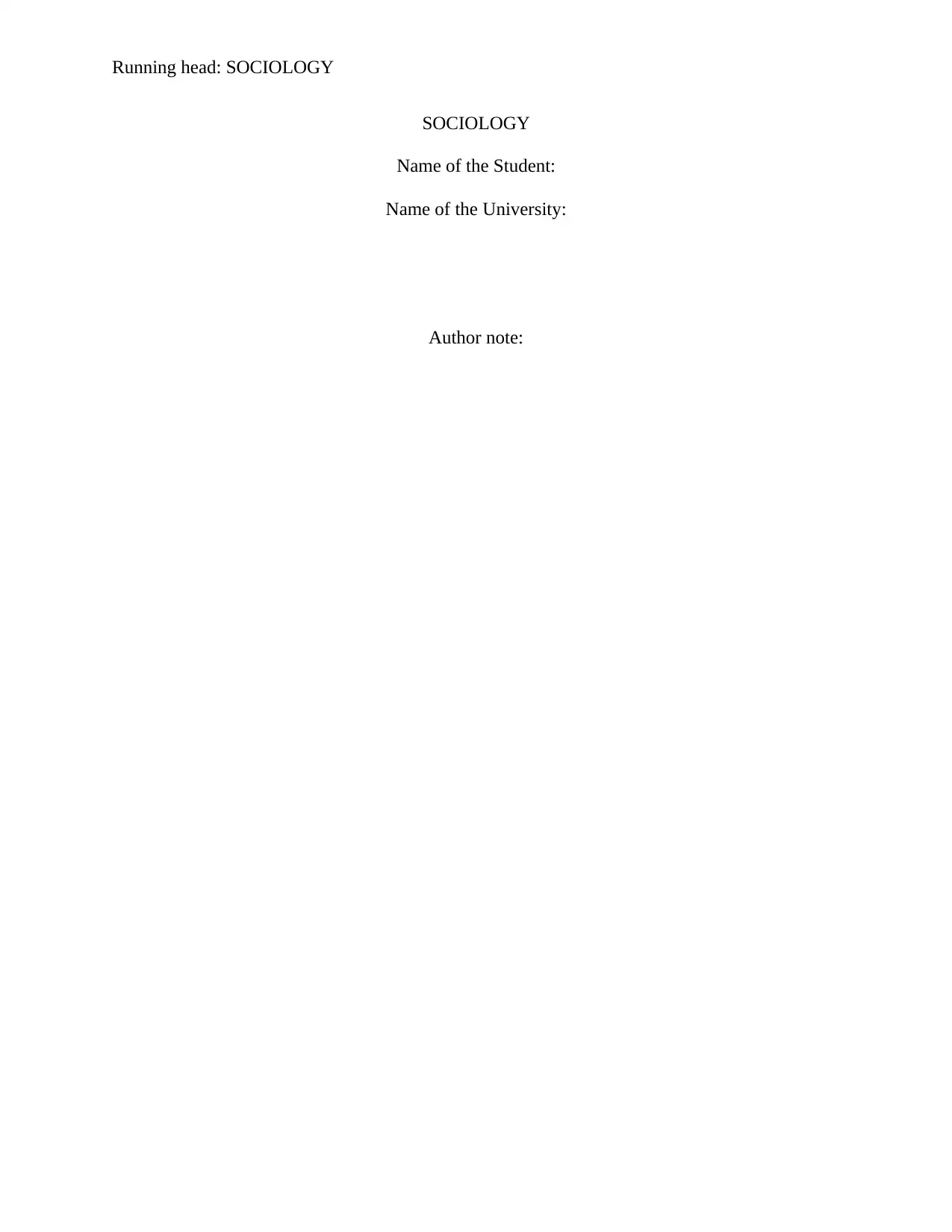
Running head: SOCIOLOGY
SOCIOLOGY
Name of the Student:
Name of the University:
Author note:
SOCIOLOGY
Name of the Student:
Name of the University:
Author note:
Paraphrase This Document
Need a fresh take? Get an instant paraphrase of this document with our AI Paraphraser
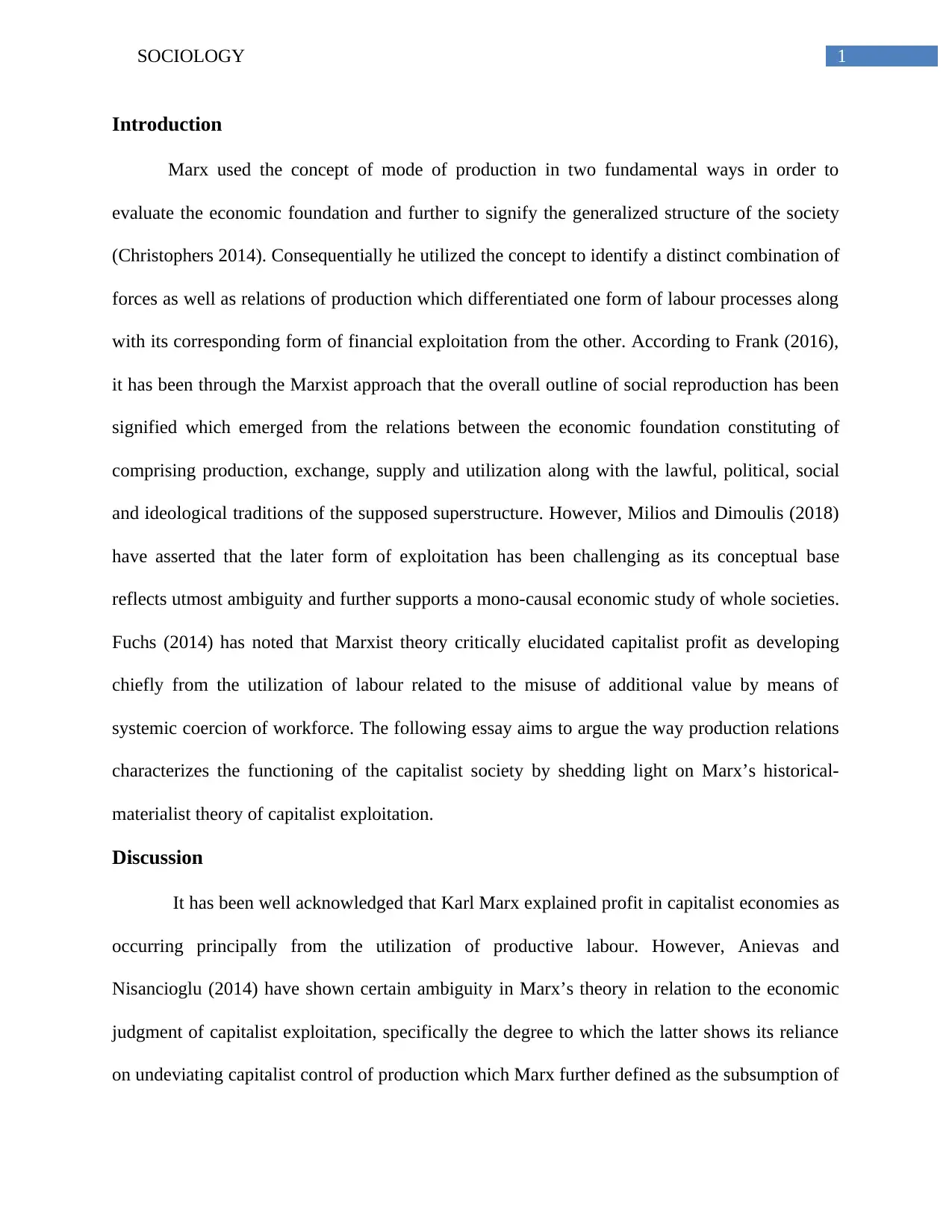
1SOCIOLOGY
Introduction
Marx used the concept of mode of production in two fundamental ways in order to
evaluate the economic foundation and further to signify the generalized structure of the society
(Christophers 2014). Consequentially he utilized the concept to identify a distinct combination of
forces as well as relations of production which differentiated one form of labour processes along
with its corresponding form of financial exploitation from the other. According to Frank (2016),
it has been through the Marxist approach that the overall outline of social reproduction has been
signified which emerged from the relations between the economic foundation constituting of
comprising production, exchange, supply and utilization along with the lawful, political, social
and ideological traditions of the supposed superstructure. However, Milios and Dimoulis (2018)
have asserted that the later form of exploitation has been challenging as its conceptual base
reflects utmost ambiguity and further supports a mono-causal economic study of whole societies.
Fuchs (2014) has noted that Marxist theory critically elucidated capitalist profit as developing
chiefly from the utilization of labour related to the misuse of additional value by means of
systemic coercion of workforce. The following essay aims to argue the way production relations
characterizes the functioning of the capitalist society by shedding light on Marx’s historical-
materialist theory of capitalist exploitation.
Discussion
It has been well acknowledged that Karl Marx explained profit in capitalist economies as
occurring principally from the utilization of productive labour. However, Anievas and
Nisancioglu (2014) have shown certain ambiguity in Marx’s theory in relation to the economic
judgment of capitalist exploitation, specifically the degree to which the latter shows its reliance
on undeviating capitalist control of production which Marx further defined as the subsumption of
Introduction
Marx used the concept of mode of production in two fundamental ways in order to
evaluate the economic foundation and further to signify the generalized structure of the society
(Christophers 2014). Consequentially he utilized the concept to identify a distinct combination of
forces as well as relations of production which differentiated one form of labour processes along
with its corresponding form of financial exploitation from the other. According to Frank (2016),
it has been through the Marxist approach that the overall outline of social reproduction has been
signified which emerged from the relations between the economic foundation constituting of
comprising production, exchange, supply and utilization along with the lawful, political, social
and ideological traditions of the supposed superstructure. However, Milios and Dimoulis (2018)
have asserted that the later form of exploitation has been challenging as its conceptual base
reflects utmost ambiguity and further supports a mono-causal economic study of whole societies.
Fuchs (2014) has noted that Marxist theory critically elucidated capitalist profit as developing
chiefly from the utilization of labour related to the misuse of additional value by means of
systemic coercion of workforce. The following essay aims to argue the way production relations
characterizes the functioning of the capitalist society by shedding light on Marx’s historical-
materialist theory of capitalist exploitation.
Discussion
It has been well acknowledged that Karl Marx explained profit in capitalist economies as
occurring principally from the utilization of productive labour. However, Anievas and
Nisancioglu (2014) have shown certain ambiguity in Marx’s theory in relation to the economic
judgment of capitalist exploitation, specifically the degree to which the latter shows its reliance
on undeviating capitalist control of production which Marx further defined as the subsumption of
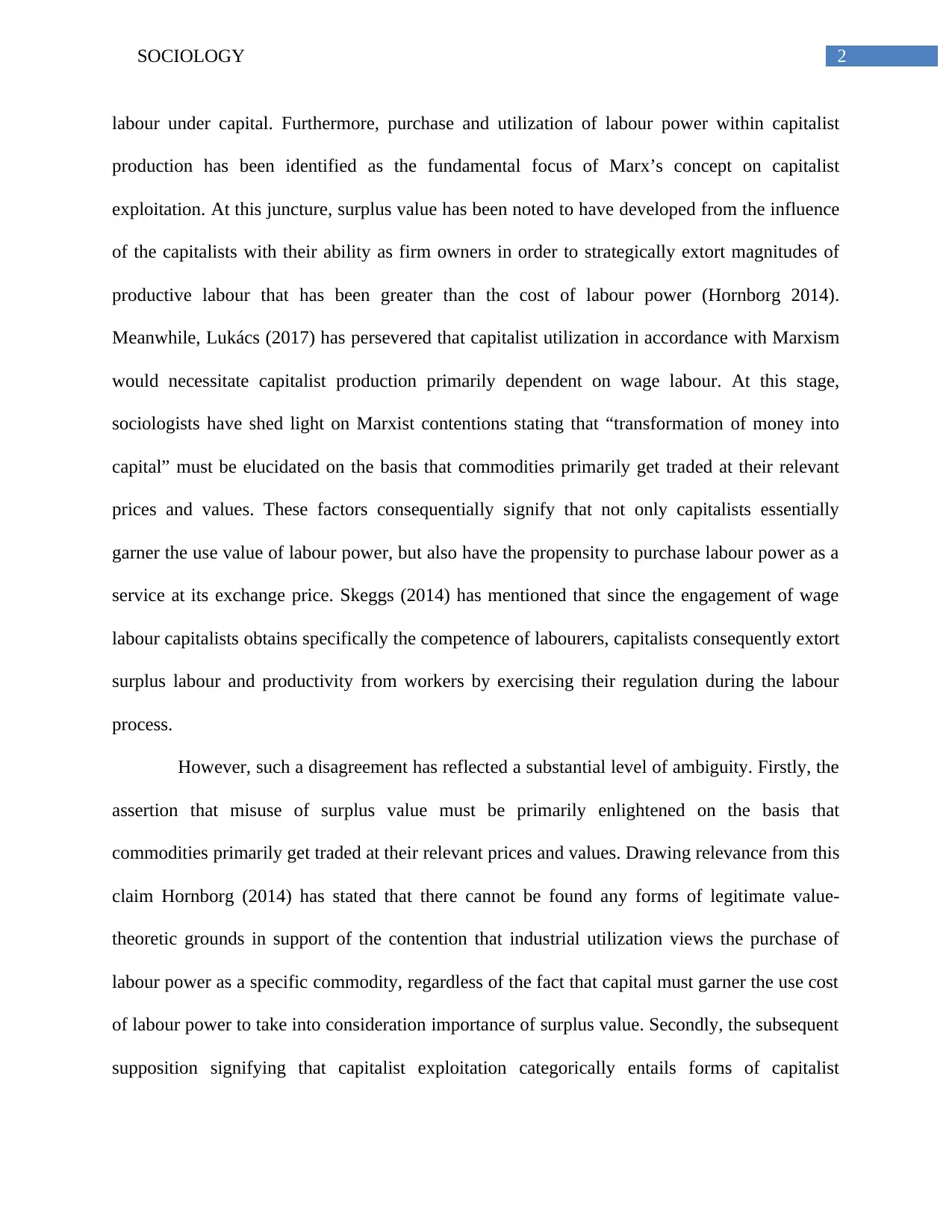
2SOCIOLOGY
labour under capital. Furthermore, purchase and utilization of labour power within capitalist
production has been identified as the fundamental focus of Marx’s concept on capitalist
exploitation. At this juncture, surplus value has been noted to have developed from the influence
of the capitalists with their ability as firm owners in order to strategically extort magnitudes of
productive labour that has been greater than the cost of labour power (Hornborg 2014).
Meanwhile, Lukács (2017) has persevered that capitalist utilization in accordance with Marxism
would necessitate capitalist production primarily dependent on wage labour. At this stage,
sociologists have shed light on Marxist contentions stating that “transformation of money into
capital” must be elucidated on the basis that commodities primarily get traded at their relevant
prices and values. These factors consequentially signify that not only capitalists essentially
garner the use value of labour power, but also have the propensity to purchase labour power as a
service at its exchange price. Skeggs (2014) has mentioned that since the engagement of wage
labour capitalists obtains specifically the competence of labourers, capitalists consequently extort
surplus labour and productivity from workers by exercising their regulation during the labour
process.
However, such a disagreement has reflected a substantial level of ambiguity. Firstly, the
assertion that misuse of surplus value must be primarily enlightened on the basis that
commodities primarily get traded at their relevant prices and values. Drawing relevance from this
claim Hornborg (2014) has stated that there cannot be found any forms of legitimate value-
theoretic grounds in support of the contention that industrial utilization views the purchase of
labour power as a specific commodity, regardless of the fact that capital must garner the use cost
of labour power to take into consideration importance of surplus value. Secondly, the subsequent
supposition signifying that capitalist exploitation categorically entails forms of capitalist
labour under capital. Furthermore, purchase and utilization of labour power within capitalist
production has been identified as the fundamental focus of Marx’s concept on capitalist
exploitation. At this juncture, surplus value has been noted to have developed from the influence
of the capitalists with their ability as firm owners in order to strategically extort magnitudes of
productive labour that has been greater than the cost of labour power (Hornborg 2014).
Meanwhile, Lukács (2017) has persevered that capitalist utilization in accordance with Marxism
would necessitate capitalist production primarily dependent on wage labour. At this stage,
sociologists have shed light on Marxist contentions stating that “transformation of money into
capital” must be elucidated on the basis that commodities primarily get traded at their relevant
prices and values. These factors consequentially signify that not only capitalists essentially
garner the use value of labour power, but also have the propensity to purchase labour power as a
service at its exchange price. Skeggs (2014) has mentioned that since the engagement of wage
labour capitalists obtains specifically the competence of labourers, capitalists consequently extort
surplus labour and productivity from workers by exercising their regulation during the labour
process.
However, such a disagreement has reflected a substantial level of ambiguity. Firstly, the
assertion that misuse of surplus value must be primarily enlightened on the basis that
commodities primarily get traded at their relevant prices and values. Drawing relevance from this
claim Hornborg (2014) has stated that there cannot be found any forms of legitimate value-
theoretic grounds in support of the contention that industrial utilization views the purchase of
labour power as a specific commodity, regardless of the fact that capital must garner the use cost
of labour power to take into consideration importance of surplus value. Secondly, the subsequent
supposition signifying that capitalist exploitation categorically entails forms of capitalist
⊘ This is a preview!⊘
Do you want full access?
Subscribe today to unlock all pages.

Trusted by 1+ million students worldwide
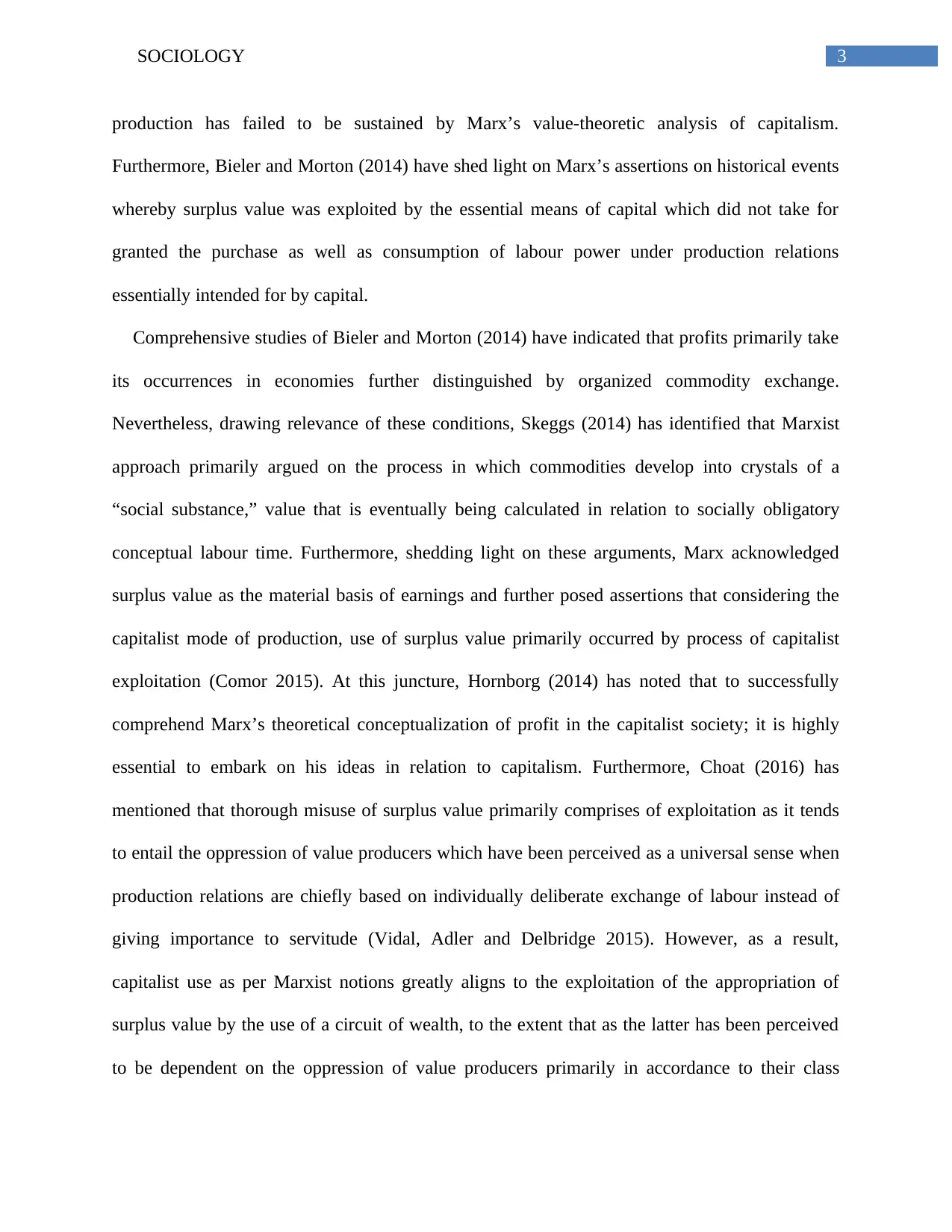
3SOCIOLOGY
production has failed to be sustained by Marx’s value-theoretic analysis of capitalism.
Furthermore, Bieler and Morton (2014) have shed light on Marx’s assertions on historical events
whereby surplus value was exploited by the essential means of capital which did not take for
granted the purchase as well as consumption of labour power under production relations
essentially intended for by capital.
Comprehensive studies of Bieler and Morton (2014) have indicated that profits primarily take
its occurrences in economies further distinguished by organized commodity exchange.
Nevertheless, drawing relevance of these conditions, Skeggs (2014) has identified that Marxist
approach primarily argued on the process in which commodities develop into crystals of a
“social substance,” value that is eventually being calculated in relation to socially obligatory
conceptual labour time. Furthermore, shedding light on these arguments, Marx acknowledged
surplus value as the material basis of earnings and further posed assertions that considering the
capitalist mode of production, use of surplus value primarily occurred by process of capitalist
exploitation (Comor 2015). At this juncture, Hornborg (2014) has noted that to successfully
comprehend Marx’s theoretical conceptualization of profit in the capitalist society; it is highly
essential to embark on his ideas in relation to capitalism. Furthermore, Choat (2016) has
mentioned that thorough misuse of surplus value primarily comprises of exploitation as it tends
to entail the oppression of value producers which have been perceived as a universal sense when
production relations are chiefly based on individually deliberate exchange of labour instead of
giving importance to servitude (Vidal, Adler and Delbridge 2015). However, as a result,
capitalist use as per Marxist notions greatly aligns to the exploitation of the appropriation of
surplus value by the use of a circuit of wealth, to the extent that as the latter has been perceived
to be dependent on the oppression of value producers primarily in accordance to their class
production has failed to be sustained by Marx’s value-theoretic analysis of capitalism.
Furthermore, Bieler and Morton (2014) have shed light on Marx’s assertions on historical events
whereby surplus value was exploited by the essential means of capital which did not take for
granted the purchase as well as consumption of labour power under production relations
essentially intended for by capital.
Comprehensive studies of Bieler and Morton (2014) have indicated that profits primarily take
its occurrences in economies further distinguished by organized commodity exchange.
Nevertheless, drawing relevance of these conditions, Skeggs (2014) has identified that Marxist
approach primarily argued on the process in which commodities develop into crystals of a
“social substance,” value that is eventually being calculated in relation to socially obligatory
conceptual labour time. Furthermore, shedding light on these arguments, Marx acknowledged
surplus value as the material basis of earnings and further posed assertions that considering the
capitalist mode of production, use of surplus value primarily occurred by process of capitalist
exploitation (Comor 2015). At this juncture, Hornborg (2014) has noted that to successfully
comprehend Marx’s theoretical conceptualization of profit in the capitalist society; it is highly
essential to embark on his ideas in relation to capitalism. Furthermore, Choat (2016) has
mentioned that thorough misuse of surplus value primarily comprises of exploitation as it tends
to entail the oppression of value producers which have been perceived as a universal sense when
production relations are chiefly based on individually deliberate exchange of labour instead of
giving importance to servitude (Vidal, Adler and Delbridge 2015). However, as a result,
capitalist use as per Marxist notions greatly aligns to the exploitation of the appropriation of
surplus value by the use of a circuit of wealth, to the extent that as the latter has been perceived
to be dependent on the oppression of value producers primarily in accordance to their class
Paraphrase This Document
Need a fresh take? Get an instant paraphrase of this document with our AI Paraphraser
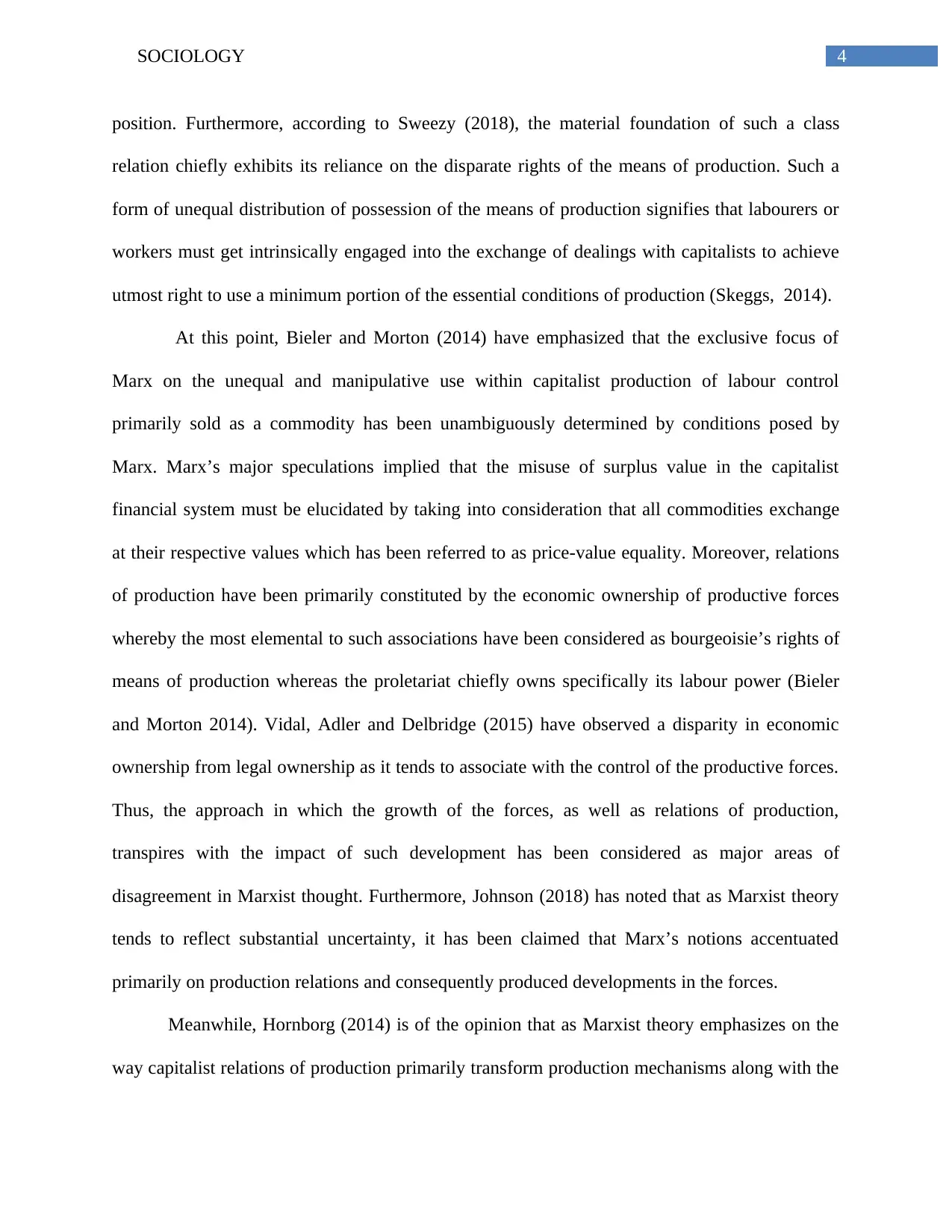
4SOCIOLOGY
position. Furthermore, according to Sweezy (2018), the material foundation of such a class
relation chiefly exhibits its reliance on the disparate rights of the means of production. Such a
form of unequal distribution of possession of the means of production signifies that labourers or
workers must get intrinsically engaged into the exchange of dealings with capitalists to achieve
utmost right to use a minimum portion of the essential conditions of production (Skeggs, 2014).
At this point, Bieler and Morton (2014) have emphasized that the exclusive focus of
Marx on the unequal and manipulative use within capitalist production of labour control
primarily sold as a commodity has been unambiguously determined by conditions posed by
Marx. Marx’s major speculations implied that the misuse of surplus value in the capitalist
financial system must be elucidated by taking into consideration that all commodities exchange
at their respective values which has been referred to as price-value equality. Moreover, relations
of production have been primarily constituted by the economic ownership of productive forces
whereby the most elemental to such associations have been considered as bourgeoisie’s rights of
means of production whereas the proletariat chiefly owns specifically its labour power (Bieler
and Morton 2014). Vidal, Adler and Delbridge (2015) have observed a disparity in economic
ownership from legal ownership as it tends to associate with the control of the productive forces.
Thus, the approach in which the growth of the forces, as well as relations of production,
transpires with the impact of such development has been considered as major areas of
disagreement in Marxist thought. Furthermore, Johnson (2018) has noted that as Marxist theory
tends to reflect substantial uncertainty, it has been claimed that Marx’s notions accentuated
primarily on production relations and consequently produced developments in the forces.
Meanwhile, Hornborg (2014) is of the opinion that as Marxist theory emphasizes on the
way capitalist relations of production primarily transform production mechanisms along with the
position. Furthermore, according to Sweezy (2018), the material foundation of such a class
relation chiefly exhibits its reliance on the disparate rights of the means of production. Such a
form of unequal distribution of possession of the means of production signifies that labourers or
workers must get intrinsically engaged into the exchange of dealings with capitalists to achieve
utmost right to use a minimum portion of the essential conditions of production (Skeggs, 2014).
At this point, Bieler and Morton (2014) have emphasized that the exclusive focus of
Marx on the unequal and manipulative use within capitalist production of labour control
primarily sold as a commodity has been unambiguously determined by conditions posed by
Marx. Marx’s major speculations implied that the misuse of surplus value in the capitalist
financial system must be elucidated by taking into consideration that all commodities exchange
at their respective values which has been referred to as price-value equality. Moreover, relations
of production have been primarily constituted by the economic ownership of productive forces
whereby the most elemental to such associations have been considered as bourgeoisie’s rights of
means of production whereas the proletariat chiefly owns specifically its labour power (Bieler
and Morton 2014). Vidal, Adler and Delbridge (2015) have observed a disparity in economic
ownership from legal ownership as it tends to associate with the control of the productive forces.
Thus, the approach in which the growth of the forces, as well as relations of production,
transpires with the impact of such development has been considered as major areas of
disagreement in Marxist thought. Furthermore, Johnson (2018) has noted that as Marxist theory
tends to reflect substantial uncertainty, it has been claimed that Marx’s notions accentuated
primarily on production relations and consequently produced developments in the forces.
Meanwhile, Hornborg (2014) is of the opinion that as Marxist theory emphasizes on the
way capitalist relations of production primarily transform production mechanisms along with the
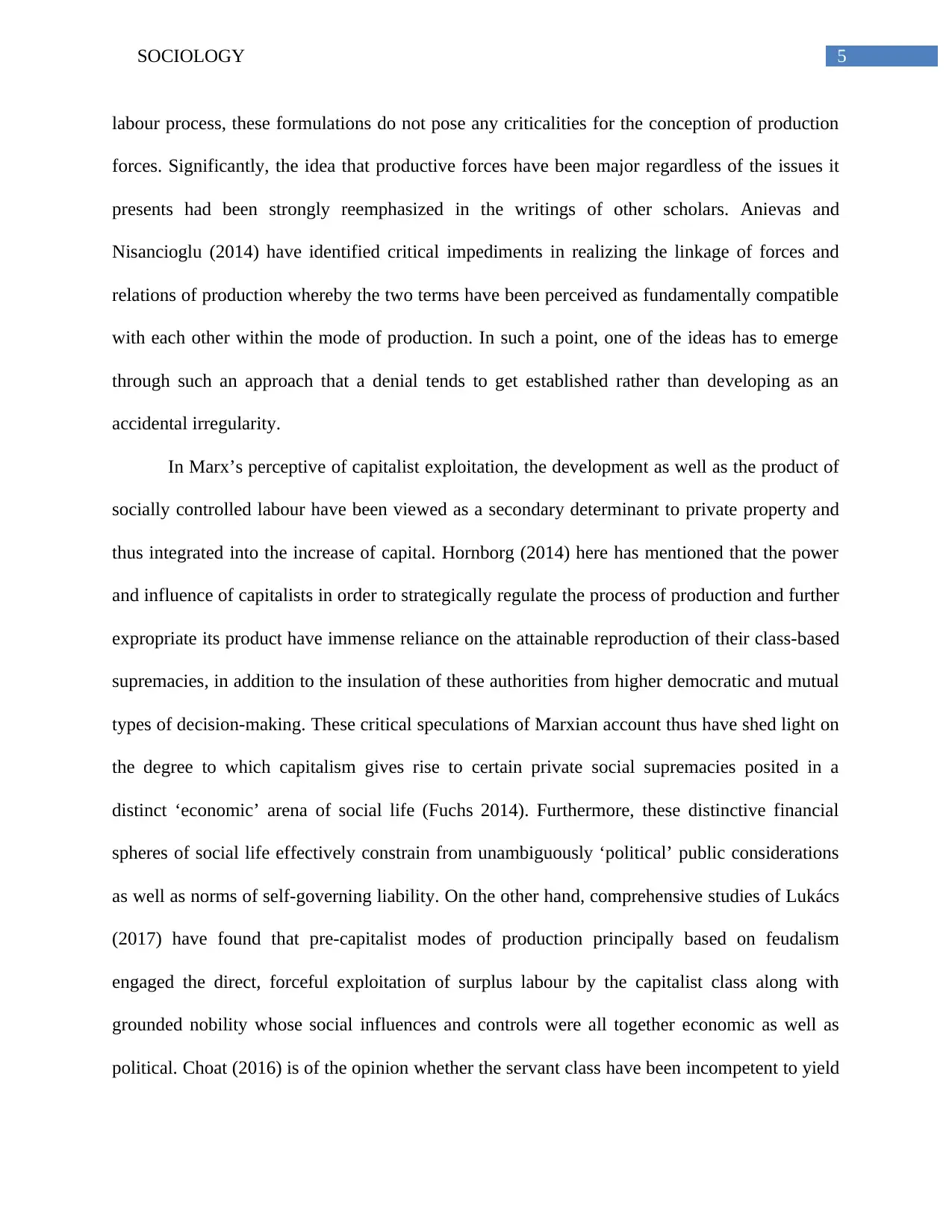
5SOCIOLOGY
labour process, these formulations do not pose any criticalities for the conception of production
forces. Significantly, the idea that productive forces have been major regardless of the issues it
presents had been strongly reemphasized in the writings of other scholars. Anievas and
Nisancioglu (2014) have identified critical impediments in realizing the linkage of forces and
relations of production whereby the two terms have been perceived as fundamentally compatible
with each other within the mode of production. In such a point, one of the ideas has to emerge
through such an approach that a denial tends to get established rather than developing as an
accidental irregularity.
In Marx’s perceptive of capitalist exploitation, the development as well as the product of
socially controlled labour have been viewed as a secondary determinant to private property and
thus integrated into the increase of capital. Hornborg (2014) here has mentioned that the power
and influence of capitalists in order to strategically regulate the process of production and further
expropriate its product have immense reliance on the attainable reproduction of their class-based
supremacies, in addition to the insulation of these authorities from higher democratic and mutual
types of decision-making. These critical speculations of Marxian account thus have shed light on
the degree to which capitalism gives rise to certain private social supremacies posited in a
distinct ‘economic’ arena of social life (Fuchs 2014). Furthermore, these distinctive financial
spheres of social life effectively constrain from unambiguously ‘political’ public considerations
as well as norms of self-governing liability. On the other hand, comprehensive studies of Lukács
(2017) have found that pre-capitalist modes of production principally based on feudalism
engaged the direct, forceful exploitation of surplus labour by the capitalist class along with
grounded nobility whose social influences and controls were all together economic as well as
political. Choat (2016) is of the opinion whether the servant class have been incompetent to yield
labour process, these formulations do not pose any criticalities for the conception of production
forces. Significantly, the idea that productive forces have been major regardless of the issues it
presents had been strongly reemphasized in the writings of other scholars. Anievas and
Nisancioglu (2014) have identified critical impediments in realizing the linkage of forces and
relations of production whereby the two terms have been perceived as fundamentally compatible
with each other within the mode of production. In such a point, one of the ideas has to emerge
through such an approach that a denial tends to get established rather than developing as an
accidental irregularity.
In Marx’s perceptive of capitalist exploitation, the development as well as the product of
socially controlled labour have been viewed as a secondary determinant to private property and
thus integrated into the increase of capital. Hornborg (2014) here has mentioned that the power
and influence of capitalists in order to strategically regulate the process of production and further
expropriate its product have immense reliance on the attainable reproduction of their class-based
supremacies, in addition to the insulation of these authorities from higher democratic and mutual
types of decision-making. These critical speculations of Marxian account thus have shed light on
the degree to which capitalism gives rise to certain private social supremacies posited in a
distinct ‘economic’ arena of social life (Fuchs 2014). Furthermore, these distinctive financial
spheres of social life effectively constrain from unambiguously ‘political’ public considerations
as well as norms of self-governing liability. On the other hand, comprehensive studies of Lukács
(2017) have found that pre-capitalist modes of production principally based on feudalism
engaged the direct, forceful exploitation of surplus labour by the capitalist class along with
grounded nobility whose social influences and controls were all together economic as well as
political. Choat (2016) is of the opinion whether the servant class have been incompetent to yield
⊘ This is a preview!⊘
Do you want full access?
Subscribe today to unlock all pages.

Trusted by 1+ million students worldwide
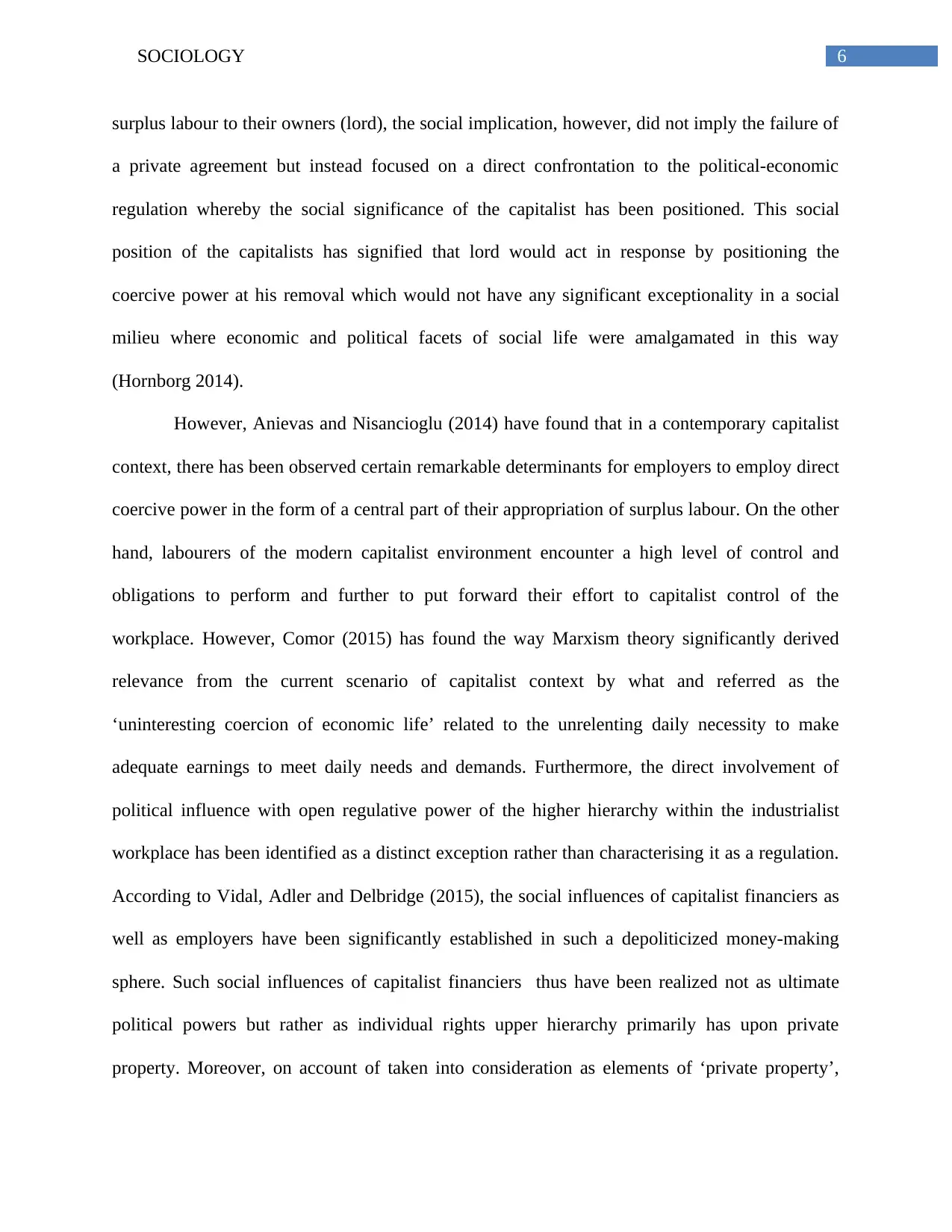
6SOCIOLOGY
surplus labour to their owners (lord), the social implication, however, did not imply the failure of
a private agreement but instead focused on a direct confrontation to the political-economic
regulation whereby the social significance of the capitalist has been positioned. This social
position of the capitalists has signified that lord would act in response by positioning the
coercive power at his removal which would not have any significant exceptionality in a social
milieu where economic and political facets of social life were amalgamated in this way
(Hornborg 2014).
However, Anievas and Nisancioglu (2014) have found that in a contemporary capitalist
context, there has been observed certain remarkable determinants for employers to employ direct
coercive power in the form of a central part of their appropriation of surplus labour. On the other
hand, labourers of the modern capitalist environment encounter a high level of control and
obligations to perform and further to put forward their effort to capitalist control of the
workplace. However, Comor (2015) has found the way Marxism theory significantly derived
relevance from the current scenario of capitalist context by what and referred as the
‘uninteresting coercion of economic life’ related to the unrelenting daily necessity to make
adequate earnings to meet daily needs and demands. Furthermore, the direct involvement of
political influence with open regulative power of the higher hierarchy within the industrialist
workplace has been identified as a distinct exception rather than characterising it as a regulation.
According to Vidal, Adler and Delbridge (2015), the social influences of capitalist financiers as
well as employers have been significantly established in such a depoliticized money-making
sphere. Such social influences of capitalist financiers thus have been realized not as ultimate
political powers but rather as individual rights upper hierarchy primarily has upon private
property. Moreover, on account of taken into consideration as elements of ‘private property’,
surplus labour to their owners (lord), the social implication, however, did not imply the failure of
a private agreement but instead focused on a direct confrontation to the political-economic
regulation whereby the social significance of the capitalist has been positioned. This social
position of the capitalists has signified that lord would act in response by positioning the
coercive power at his removal which would not have any significant exceptionality in a social
milieu where economic and political facets of social life were amalgamated in this way
(Hornborg 2014).
However, Anievas and Nisancioglu (2014) have found that in a contemporary capitalist
context, there has been observed certain remarkable determinants for employers to employ direct
coercive power in the form of a central part of their appropriation of surplus labour. On the other
hand, labourers of the modern capitalist environment encounter a high level of control and
obligations to perform and further to put forward their effort to capitalist control of the
workplace. However, Comor (2015) has found the way Marxism theory significantly derived
relevance from the current scenario of capitalist context by what and referred as the
‘uninteresting coercion of economic life’ related to the unrelenting daily necessity to make
adequate earnings to meet daily needs and demands. Furthermore, the direct involvement of
political influence with open regulative power of the higher hierarchy within the industrialist
workplace has been identified as a distinct exception rather than characterising it as a regulation.
According to Vidal, Adler and Delbridge (2015), the social influences of capitalist financiers as
well as employers have been significantly established in such a depoliticized money-making
sphere. Such social influences of capitalist financiers thus have been realized not as ultimate
political powers but rather as individual rights upper hierarchy primarily has upon private
property. Moreover, on account of taken into consideration as elements of ‘private property’,
Paraphrase This Document
Need a fresh take? Get an instant paraphrase of this document with our AI Paraphraser
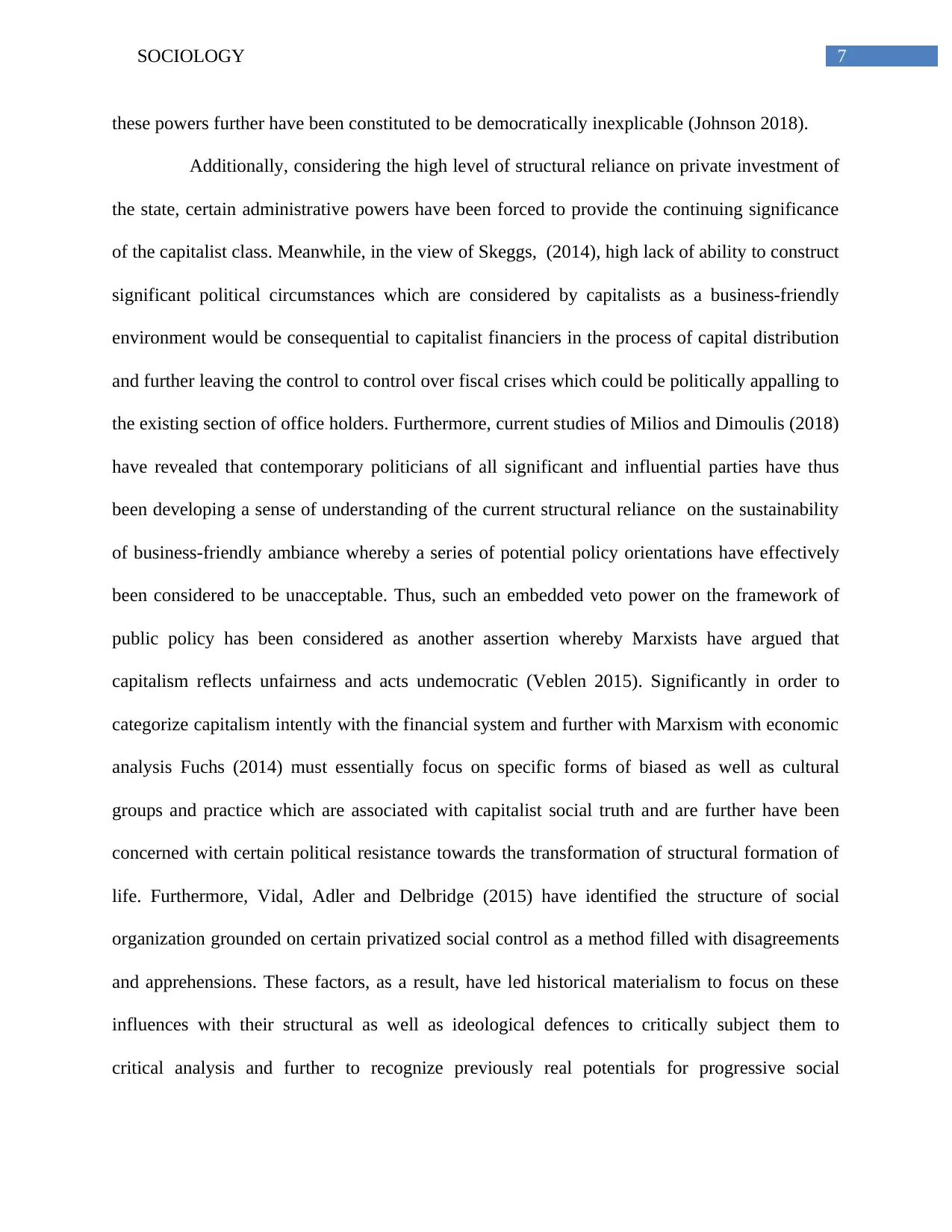
7SOCIOLOGY
these powers further have been constituted to be democratically inexplicable (Johnson 2018).
Additionally, considering the high level of structural reliance on private investment of
the state, certain administrative powers have been forced to provide the continuing significance
of the capitalist class. Meanwhile, in the view of Skeggs, (2014), high lack of ability to construct
significant political circumstances which are considered by capitalists as a business-friendly
environment would be consequential to capitalist financiers in the process of capital distribution
and further leaving the control to control over fiscal crises which could be politically appalling to
the existing section of office holders. Furthermore, current studies of Milios and Dimoulis (2018)
have revealed that contemporary politicians of all significant and influential parties have thus
been developing a sense of understanding of the current structural reliance on the sustainability
of business-friendly ambiance whereby a series of potential policy orientations have effectively
been considered to be unacceptable. Thus, such an embedded veto power on the framework of
public policy has been considered as another assertion whereby Marxists have argued that
capitalism reflects unfairness and acts undemocratic (Veblen 2015). Significantly in order to
categorize capitalism intently with the financial system and further with Marxism with economic
analysis Fuchs (2014) must essentially focus on specific forms of biased as well as cultural
groups and practice which are associated with capitalist social truth and are further have been
concerned with certain political resistance towards the transformation of structural formation of
life. Furthermore, Vidal, Adler and Delbridge (2015) have identified the structure of social
organization grounded on certain privatized social control as a method filled with disagreements
and apprehensions. These factors, as a result, have led historical materialism to focus on these
influences with their structural as well as ideological defences to critically subject them to
critical analysis and further to recognize previously real potentials for progressive social
these powers further have been constituted to be democratically inexplicable (Johnson 2018).
Additionally, considering the high level of structural reliance on private investment of
the state, certain administrative powers have been forced to provide the continuing significance
of the capitalist class. Meanwhile, in the view of Skeggs, (2014), high lack of ability to construct
significant political circumstances which are considered by capitalists as a business-friendly
environment would be consequential to capitalist financiers in the process of capital distribution
and further leaving the control to control over fiscal crises which could be politically appalling to
the existing section of office holders. Furthermore, current studies of Milios and Dimoulis (2018)
have revealed that contemporary politicians of all significant and influential parties have thus
been developing a sense of understanding of the current structural reliance on the sustainability
of business-friendly ambiance whereby a series of potential policy orientations have effectively
been considered to be unacceptable. Thus, such an embedded veto power on the framework of
public policy has been considered as another assertion whereby Marxists have argued that
capitalism reflects unfairness and acts undemocratic (Veblen 2015). Significantly in order to
categorize capitalism intently with the financial system and further with Marxism with economic
analysis Fuchs (2014) must essentially focus on specific forms of biased as well as cultural
groups and practice which are associated with capitalist social truth and are further have been
concerned with certain political resistance towards the transformation of structural formation of
life. Furthermore, Vidal, Adler and Delbridge (2015) have identified the structure of social
organization grounded on certain privatized social control as a method filled with disagreements
and apprehensions. These factors, as a result, have led historical materialism to focus on these
influences with their structural as well as ideological defences to critically subject them to
critical analysis and further to recognize previously real potentials for progressive social
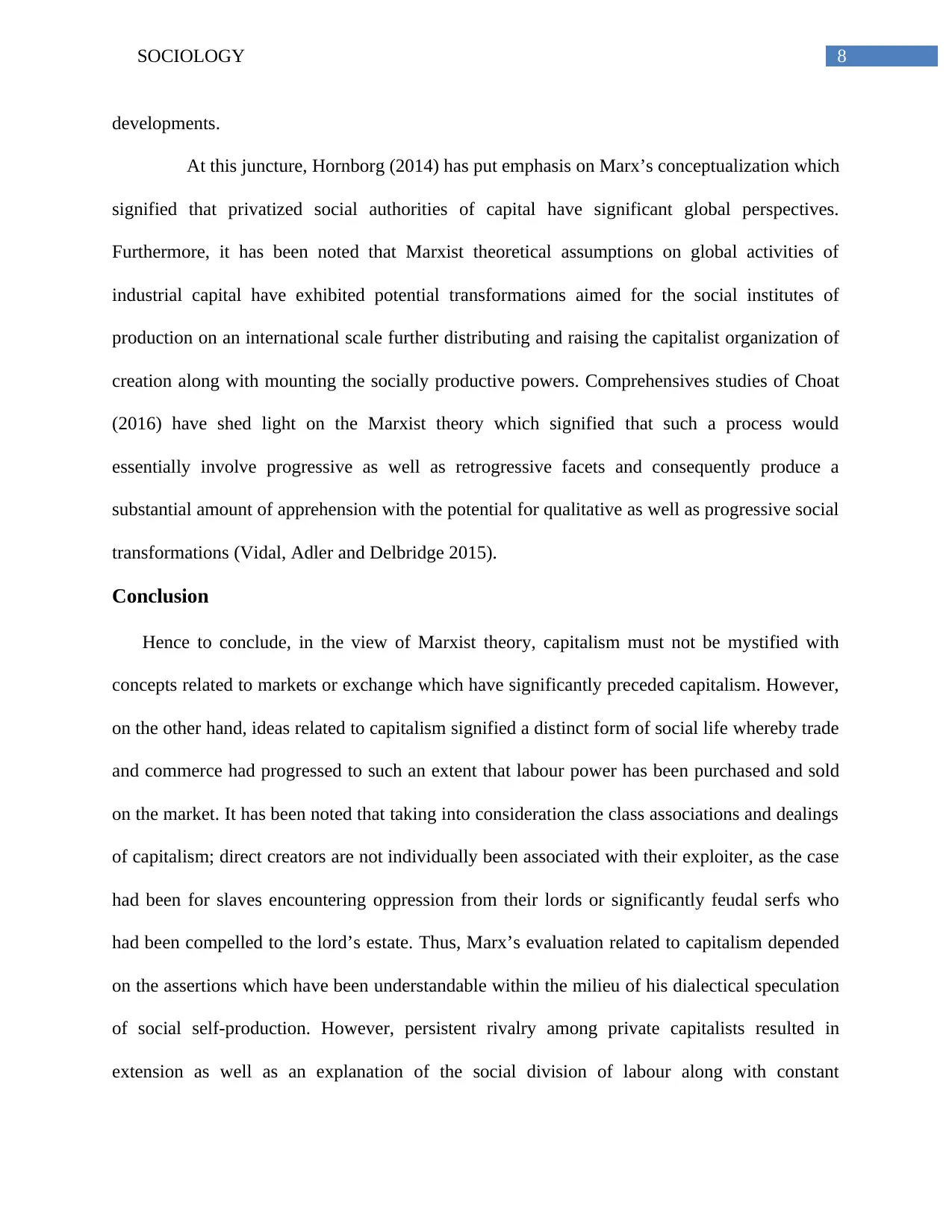
8SOCIOLOGY
developments.
At this juncture, Hornborg (2014) has put emphasis on Marx’s conceptualization which
signified that privatized social authorities of capital have significant global perspectives.
Furthermore, it has been noted that Marxist theoretical assumptions on global activities of
industrial capital have exhibited potential transformations aimed for the social institutes of
production on an international scale further distributing and raising the capitalist organization of
creation along with mounting the socially productive powers. Comprehensives studies of Choat
(2016) have shed light on the Marxist theory which signified that such a process would
essentially involve progressive as well as retrogressive facets and consequently produce a
substantial amount of apprehension with the potential for qualitative as well as progressive social
transformations (Vidal, Adler and Delbridge 2015).
Conclusion
Hence to conclude, in the view of Marxist theory, capitalism must not be mystified with
concepts related to markets or exchange which have significantly preceded capitalism. However,
on the other hand, ideas related to capitalism signified a distinct form of social life whereby trade
and commerce had progressed to such an extent that labour power has been purchased and sold
on the market. It has been noted that taking into consideration the class associations and dealings
of capitalism; direct creators are not individually been associated with their exploiter, as the case
had been for slaves encountering oppression from their lords or significantly feudal serfs who
had been compelled to the lord’s estate. Thus, Marx’s evaluation related to capitalism depended
on the assertions which have been understandable within the milieu of his dialectical speculation
of social self-production. However, persistent rivalry among private capitalists resulted in
extension as well as an explanation of the social division of labour along with constant
developments.
At this juncture, Hornborg (2014) has put emphasis on Marx’s conceptualization which
signified that privatized social authorities of capital have significant global perspectives.
Furthermore, it has been noted that Marxist theoretical assumptions on global activities of
industrial capital have exhibited potential transformations aimed for the social institutes of
production on an international scale further distributing and raising the capitalist organization of
creation along with mounting the socially productive powers. Comprehensives studies of Choat
(2016) have shed light on the Marxist theory which signified that such a process would
essentially involve progressive as well as retrogressive facets and consequently produce a
substantial amount of apprehension with the potential for qualitative as well as progressive social
transformations (Vidal, Adler and Delbridge 2015).
Conclusion
Hence to conclude, in the view of Marxist theory, capitalism must not be mystified with
concepts related to markets or exchange which have significantly preceded capitalism. However,
on the other hand, ideas related to capitalism signified a distinct form of social life whereby trade
and commerce had progressed to such an extent that labour power has been purchased and sold
on the market. It has been noted that taking into consideration the class associations and dealings
of capitalism; direct creators are not individually been associated with their exploiter, as the case
had been for slaves encountering oppression from their lords or significantly feudal serfs who
had been compelled to the lord’s estate. Thus, Marx’s evaluation related to capitalism depended
on the assertions which have been understandable within the milieu of his dialectical speculation
of social self-production. However, persistent rivalry among private capitalists resulted in
extension as well as an explanation of the social division of labour along with constant
⊘ This is a preview!⊘
Do you want full access?
Subscribe today to unlock all pages.

Trusted by 1+ million students worldwide
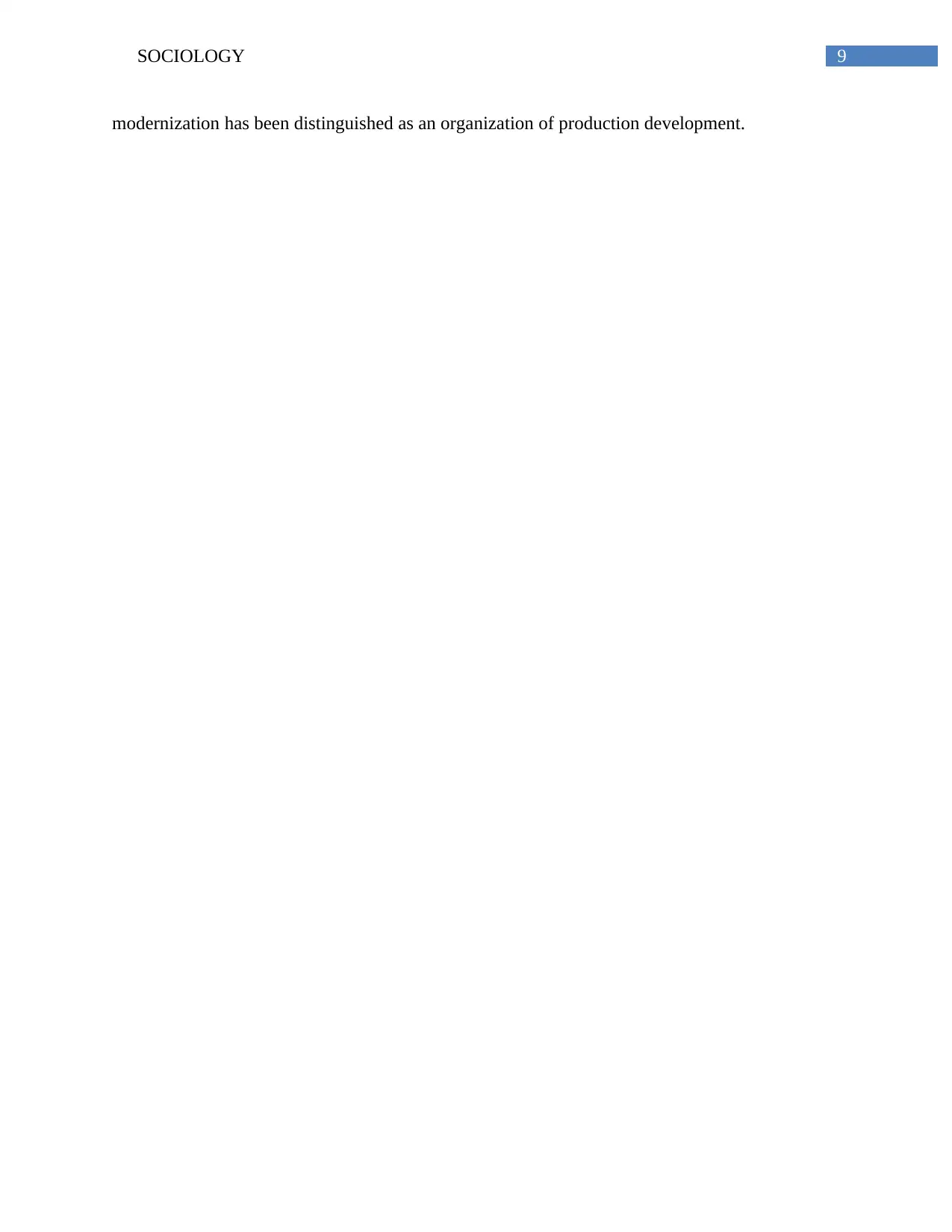
9SOCIOLOGY
modernization has been distinguished as an organization of production development.
modernization has been distinguished as an organization of production development.
Paraphrase This Document
Need a fresh take? Get an instant paraphrase of this document with our AI Paraphraser
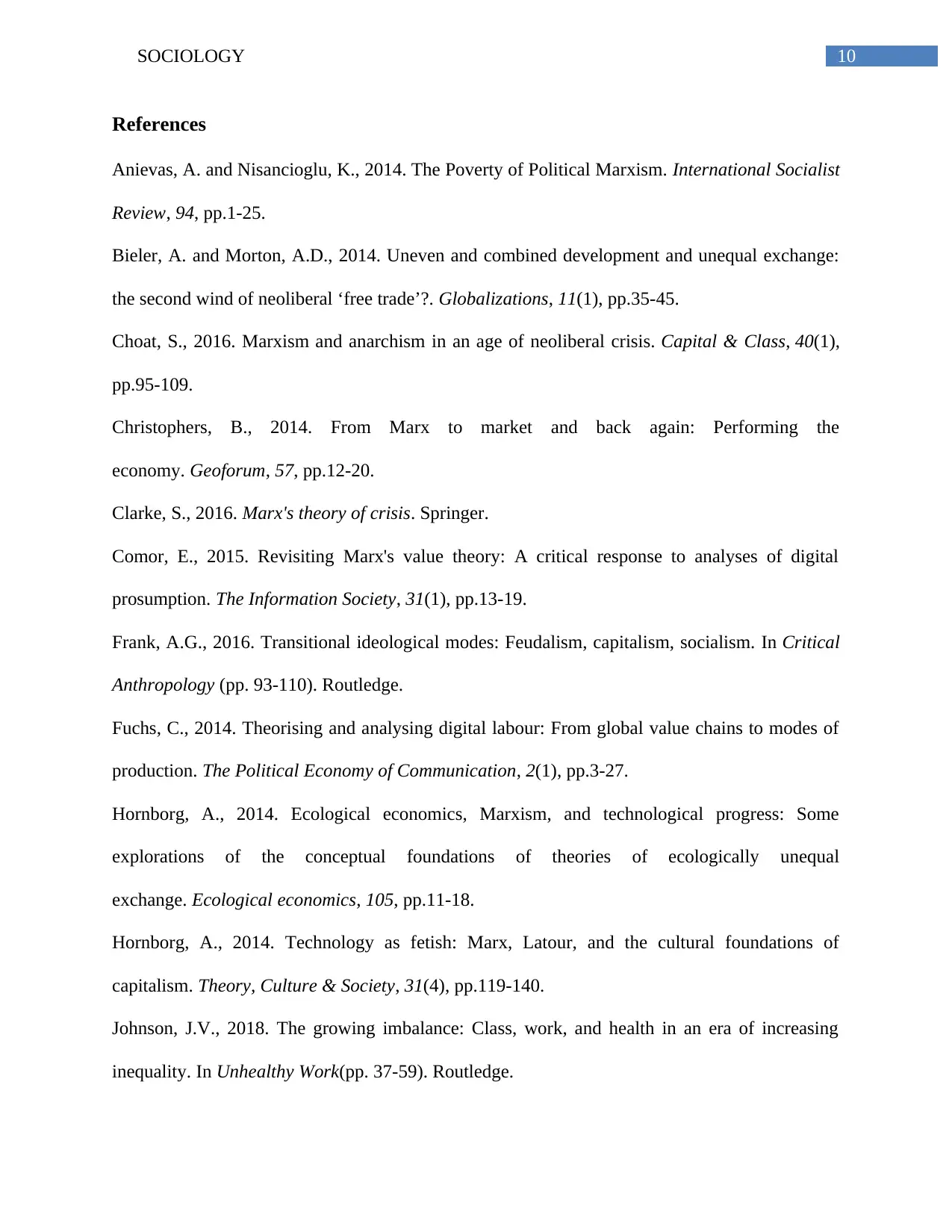
10SOCIOLOGY
References
Anievas, A. and Nisancioglu, K., 2014. The Poverty of Political Marxism. International Socialist
Review, 94, pp.1-25.
Bieler, A. and Morton, A.D., 2014. Uneven and combined development and unequal exchange:
the second wind of neoliberal ‘free trade’?. Globalizations, 11(1), pp.35-45.
Choat, S., 2016. Marxism and anarchism in an age of neoliberal crisis. Capital & Class, 40(1),
pp.95-109.
Christophers, B., 2014. From Marx to market and back again: Performing the
economy. Geoforum, 57, pp.12-20.
Clarke, S., 2016. Marx's theory of crisis. Springer.
Comor, E., 2015. Revisiting Marx's value theory: A critical response to analyses of digital
prosumption. The Information Society, 31(1), pp.13-19.
Frank, A.G., 2016. Transitional ideological modes: Feudalism, capitalism, socialism. In Critical
Anthropology (pp. 93-110). Routledge.
Fuchs, C., 2014. Theorising and analysing digital labour: From global value chains to modes of
production. The Political Economy of Communication, 2(1), pp.3-27.
Hornborg, A., 2014. Ecological economics, Marxism, and technological progress: Some
explorations of the conceptual foundations of theories of ecologically unequal
exchange. Ecological economics, 105, pp.11-18.
Hornborg, A., 2014. Technology as fetish: Marx, Latour, and the cultural foundations of
capitalism. Theory, Culture & Society, 31(4), pp.119-140.
Johnson, J.V., 2018. The growing imbalance: Class, work, and health in an era of increasing
inequality. In Unhealthy Work(pp. 37-59). Routledge.
References
Anievas, A. and Nisancioglu, K., 2014. The Poverty of Political Marxism. International Socialist
Review, 94, pp.1-25.
Bieler, A. and Morton, A.D., 2014. Uneven and combined development and unequal exchange:
the second wind of neoliberal ‘free trade’?. Globalizations, 11(1), pp.35-45.
Choat, S., 2016. Marxism and anarchism in an age of neoliberal crisis. Capital & Class, 40(1),
pp.95-109.
Christophers, B., 2014. From Marx to market and back again: Performing the
economy. Geoforum, 57, pp.12-20.
Clarke, S., 2016. Marx's theory of crisis. Springer.
Comor, E., 2015. Revisiting Marx's value theory: A critical response to analyses of digital
prosumption. The Information Society, 31(1), pp.13-19.
Frank, A.G., 2016. Transitional ideological modes: Feudalism, capitalism, socialism. In Critical
Anthropology (pp. 93-110). Routledge.
Fuchs, C., 2014. Theorising and analysing digital labour: From global value chains to modes of
production. The Political Economy of Communication, 2(1), pp.3-27.
Hornborg, A., 2014. Ecological economics, Marxism, and technological progress: Some
explorations of the conceptual foundations of theories of ecologically unequal
exchange. Ecological economics, 105, pp.11-18.
Hornborg, A., 2014. Technology as fetish: Marx, Latour, and the cultural foundations of
capitalism. Theory, Culture & Society, 31(4), pp.119-140.
Johnson, J.V., 2018. The growing imbalance: Class, work, and health in an era of increasing
inequality. In Unhealthy Work(pp. 37-59). Routledge.
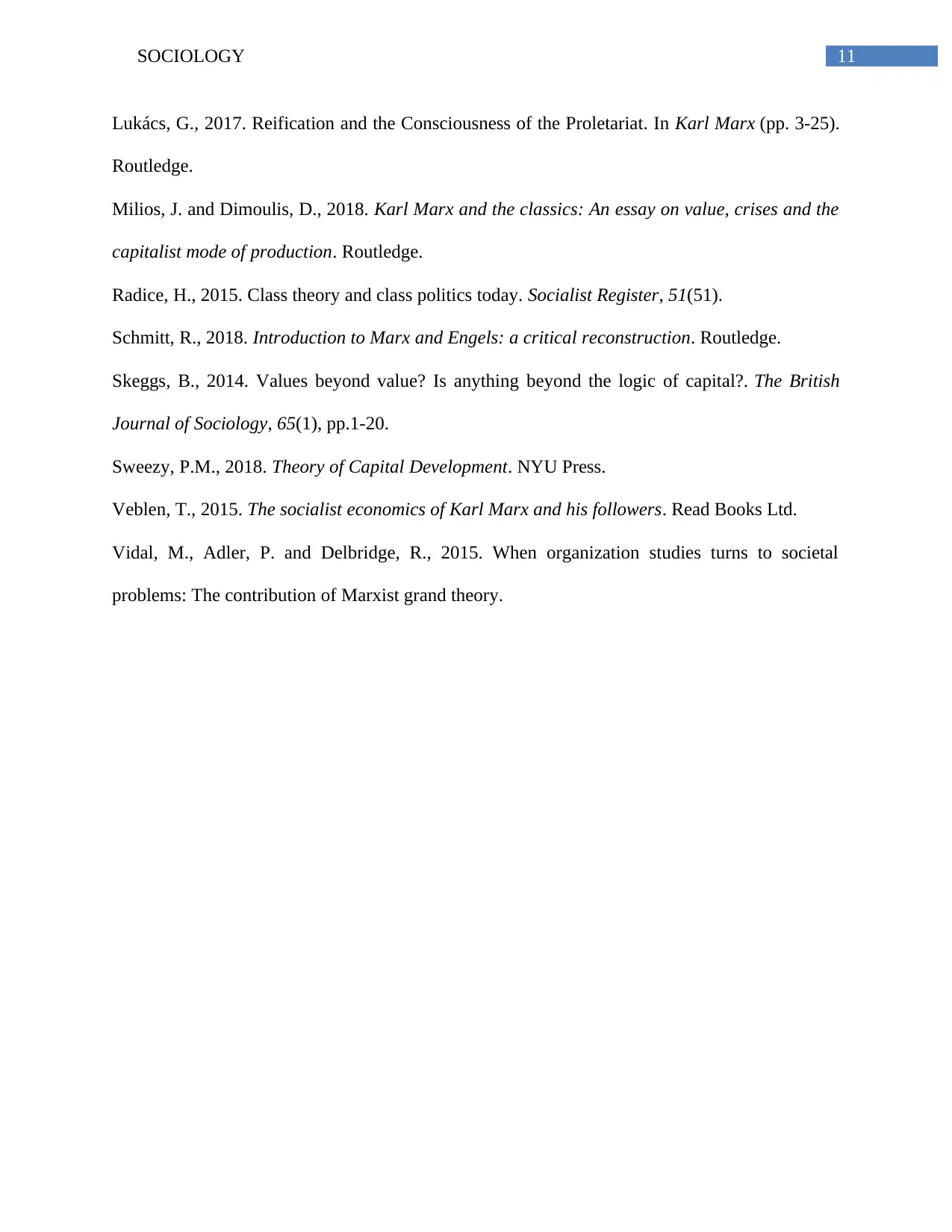
11SOCIOLOGY
Lukács, G., 2017. Reification and the Consciousness of the Proletariat. In Karl Marx (pp. 3-25).
Routledge.
Milios, J. and Dimoulis, D., 2018. Karl Marx and the classics: An essay on value, crises and the
capitalist mode of production. Routledge.
Radice, H., 2015. Class theory and class politics today. Socialist Register, 51(51).
Schmitt, R., 2018. Introduction to Marx and Engels: a critical reconstruction. Routledge.
Skeggs, B., 2014. Values beyond value? Is anything beyond the logic of capital?. The British
Journal of Sociology, 65(1), pp.1-20.
Sweezy, P.M., 2018. Theory of Capital Development. NYU Press.
Veblen, T., 2015. The socialist economics of Karl Marx and his followers. Read Books Ltd.
Vidal, M., Adler, P. and Delbridge, R., 2015. When organization studies turns to societal
problems: The contribution of Marxist grand theory.
Lukács, G., 2017. Reification and the Consciousness of the Proletariat. In Karl Marx (pp. 3-25).
Routledge.
Milios, J. and Dimoulis, D., 2018. Karl Marx and the classics: An essay on value, crises and the
capitalist mode of production. Routledge.
Radice, H., 2015. Class theory and class politics today. Socialist Register, 51(51).
Schmitt, R., 2018. Introduction to Marx and Engels: a critical reconstruction. Routledge.
Skeggs, B., 2014. Values beyond value? Is anything beyond the logic of capital?. The British
Journal of Sociology, 65(1), pp.1-20.
Sweezy, P.M., 2018. Theory of Capital Development. NYU Press.
Veblen, T., 2015. The socialist economics of Karl Marx and his followers. Read Books Ltd.
Vidal, M., Adler, P. and Delbridge, R., 2015. When organization studies turns to societal
problems: The contribution of Marxist grand theory.
⊘ This is a preview!⊘
Do you want full access?
Subscribe today to unlock all pages.

Trusted by 1+ million students worldwide
1 out of 12
Related Documents
Your All-in-One AI-Powered Toolkit for Academic Success.
+13062052269
info@desklib.com
Available 24*7 on WhatsApp / Email
![[object Object]](/_next/static/media/star-bottom.7253800d.svg)
Unlock your academic potential
Copyright © 2020–2026 A2Z Services. All Rights Reserved. Developed and managed by ZUCOL.




![Contemporary People Management: Work Design Report - [University Name]](/_next/image/?url=https%3A%2F%2Fdesklib.com%2Fmedia%2Fimages%2Fjz%2F9e5ce4dc66de4c8cad7cec279ceed987.jpg&w=256&q=75)